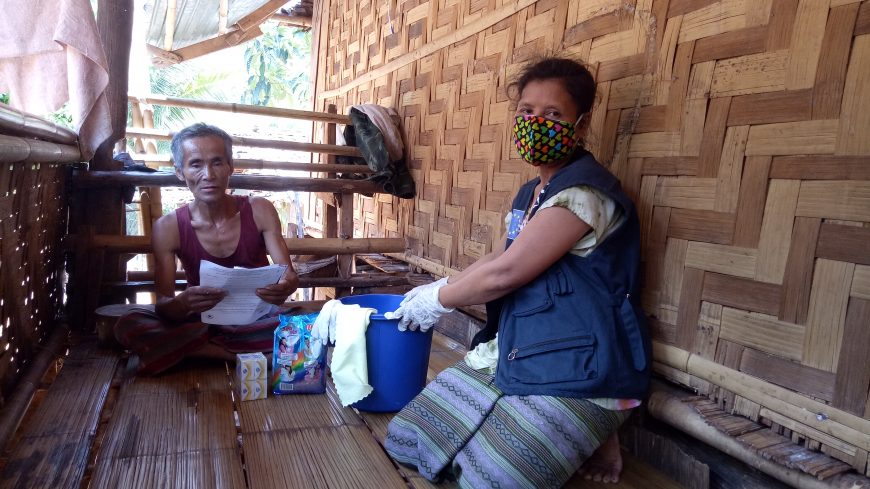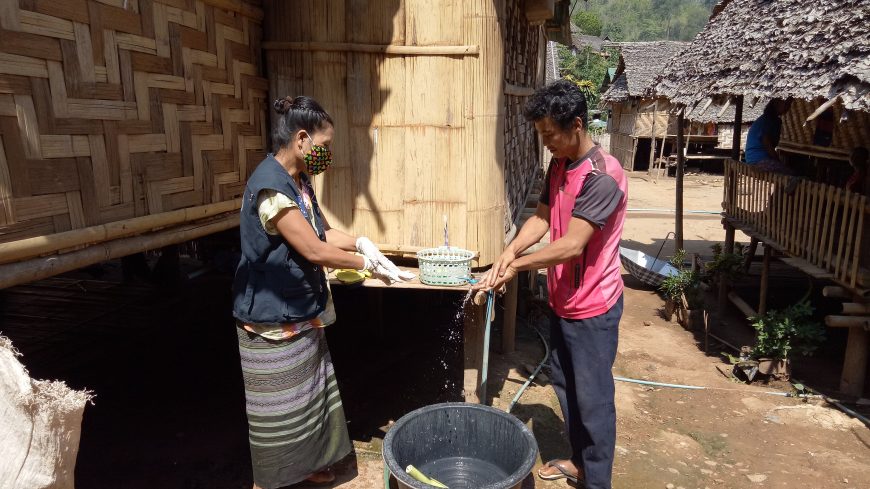Who could have supported ACTED Covid-19 home-visit interventions in refugee camps better than the residents themselves?
To prevent the virus from entering Ban Mai Nai Soi and Ban Mae Surin refugee camps on the Thai-Myanmar border, 36 Myanmar refugees joined ACTED to conduct information sessions on Covid-19 and Hygiene Kits distribution to all camp residents.
We asked four of them to share their experience with us.
From ACTED ex-trainees to ACTED camp-based workers
Aged 19 to 51 years old, they speak Burmese, Karen and/or Karenni (local languages from Myanmar). When they heard of the opportunity to join ACTED for a month, all of them were familiar with the organization.
In 2015, both Akamin and Be Bya Na, only 15 years old at the time, graduated from ACTED Motorcycle and Electric Wiring and Sewing trainings in Ban Mai Nai Soi camp, attending each day after school. Be Bya Na remembers enrolling to the latter training as she wanted to get additional skills after school to increase her chances to become a successful businesswoman one day.
To learn about office work, Kee Ler Htoo, a 50-year old mother of nine children, graduated from ACTED’s advanced computing course in 2015 and has been working ever since in the Camp Livelihoods Committee of her camp, as a Livelihood coordinator.
Interested in IT for years, Yar Ree Htoo, a 51-year-old gardening enthusiast, enrolled in the computer course in 2019. “I learned how to use Microsoft, Excel, Photoshop, among many other things and it was so helpful.”
This year, the four of them became camp-based workers, with the ultimate goal to support and inform their community about Covid-19. When asked about why it was important for everyone to be aware and understand how to be protected from it, Be Bya Na responded “to help and save other lives.”

Involving camp-residents through Hygiene Kits distribution and home visit sensitization
To conduct their activities, camp-based workers worked in pairs. Akamin and Be Bya Na, long-time friends, decided to conduct their home visits together, first participating in hygiene practice trainings and receiving Personal Protective Equipment (PPE), namely a cloth mask, gloves and hand sanitizers.
Each day, they visited approximately five households, always ensuring to wear a mask and to respect a 2-meter social distancing while interacting with their fellow camp-residents.

To understand how much each household members knew about the virus, a survey was conducted at the beginning of each home visit. Camp-resident were asked multiple choice questions, such as:
- How does the coronavirus spread?
- What are the main symptoms of Covid-19?
- Do you know in which ways you can protect yourself from being infected with the virus?
- What to do if someone from your family has symptoms?
- How far should you be when talking/interacting with someone?
With the support of informative and inclusive posters provided by ACTED, camp-based workers conducted thorough sensitization and demonstrations on hygiene best practices such as the steps of proper handwashing and how to use and wash a cloth mask among others.
Solidarity and community wellbeing
Overall, camp residents have been welcoming and grateful for the quick and efficient services they received. They have shown great interests in the project and were reported participating actively to the conversations and demonstrations held by the camp-based workers. Some camp-resident even stated, joyfully, that it was their first home visit ever!
As for ACTED camp-based workers, who received a salary at the end of their intervention, they recall this experience has a very positive one and an essential way to support the wellbeing and the needs of their community in such an uncertain period. When asked whether or not this experience improved his livelihood, Yar Ree Htoo, said: “To me it is not really about livelihood but rather about community healthcare and diseases prevention.”
With the financial support of Start Network’s Start Fund, backed by UK Aid and Ikea Foundation, in just a month, ACTED supported close to 10,000 camp residents by enabling their protection from Covid-19 through the delivery of hygiene kits, comprised of one bar of soap, powder detergent, dishwashing liquid, dishrag, gloves, the delivery of sewing materials to produce 5,000 cloth masks and the provision of general information to help them prevent the spread of Covid-19, such as how to recognize symptoms and the proper ways to wear and wash a cloth mask.
As of May 28th, 2020, all 2,259 households residing in both camps have received Hygiene Kits and information about Covid-19.